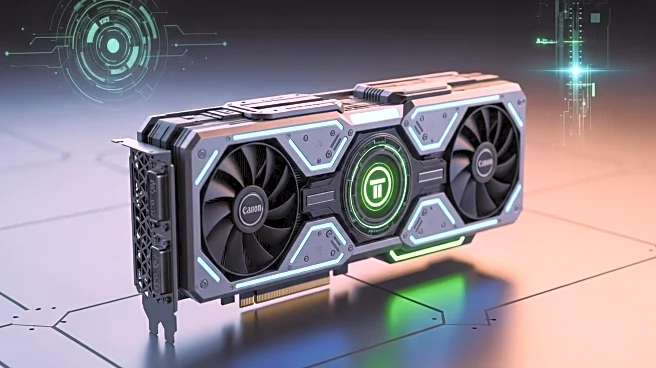What's Happening?
NVIDIA has launched its latest graphics card, the RTX 5080, which is powered by the new Blackwell architecture. This high-performance GPU is designed for gamers and content creators seeking top-tier technology. The RTX 5080 features AI-enhanced rendering capabilities with DLSS 4, allowing for improved graphics and faster processing. It includes 16GB of GDDR7 memory, providing greater bandwidth and faster access to data compared to previous generations. The card is available at a discounted price of $999 during an early October Prime Day sale, down from its original price of $1,264. The ASUS Prime GeForce RTX 5080 is also designed for small-form-factor PCs, offering high performance without compromising on power.
Why It's Important?
The introduction of the RTX 5080 marks a significant advancement in GPU technology, particularly with the Blackwell architecture's AI-enhanced rendering capabilities. This development is crucial for the gaming and content creation industries, as it allows for higher frame rates and better graphics quality. The discounted price makes this cutting-edge technology more accessible to consumers, potentially increasing adoption rates and driving competition in the market. The card's compatibility with small-form-factor PCs also broadens its appeal, catering to users who require powerful performance in compact builds.
What's Next?
As the RTX 5080 becomes available, it is expected to influence the market dynamics for high-performance GPUs. Competitors may respond by introducing similar technologies or offering competitive pricing to attract consumers. The adoption of Blackwell architecture could lead to further innovations in AI-enhanced graphics processing, impacting future developments in gaming and content creation. Additionally, the success of the RTX 5080 could encourage NVIDIA to continue investing in advanced technologies and expanding its product offerings.
Beyond the Headlines
The RTX 5080's launch highlights the growing importance of AI in graphics processing, which could lead to broader applications beyond gaming and content creation. As AI technology continues to evolve, it may play a role in other industries, such as virtual reality and simulation. The emphasis on small-form-factor compatibility also reflects a trend towards more compact and efficient computing solutions, which could influence future hardware designs.











